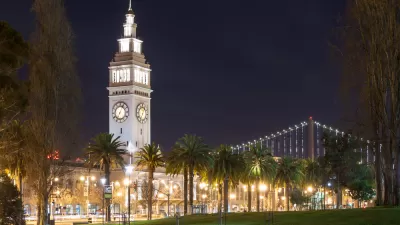Voters gave Forest City Enterprises' Pier 70 development the go-ahead on Tuesday by increasing height limits from 40 to 90 feet. The 65-acre property will be developed into mixed use, with 2,000 housing units, 30 percent affordable, and open space.
"In a city where waterfront development proposals invariably become political brawls, developer Forest City took a different tack at Pier 70, spending three years meeting with neighbors before coming up with a project that had what most residents were looking for: ample affordable housing, plenty of open space, and heights that would not block views or cast shadows in the adjacent Dogpatch (neighborhood)," writes J.K. Dineen of the San Francisco Chronicle about the passage of Prop. F. The developer initiative was described here earlier.
The project won the endorsement of every elected official in town, environmental groups such as the Sierra Club, and neighborhood coalitions including the Dogpatch Neighborhood Association.
Prop F won with 72.4% of the vote, reports San Francisco's Department of Elections.
By contrast, voters rejected the controversial 8 Washington condo project a year ago and approved Prop B, a height restriction ordinance last June that requires developers to obtain voter approval on waterfront developments exceeding the existing 40 foot height limit.
Also on Tuesday, voters rejected "Prop. G, an antispeculation ballot measure that would impose a gradual real estate transfer tax on any short-term flip," writes Dineen.
Voters approved a third real estate measure, Prop. K, which "will make it official city policy to construct or rehabilitate 30,000 new housing units by 2020, with at least one-third of those permanently affordable to low- and moderate-income households, and half within reach of middle-class San Franciscans," adds Dineen.
Forest City is also the developer of Atlantic Yards, a mixed use, 22-acre development in Brooklyn, New York.
FULL STORY: S.F. developers win on waterfront, antispeculation measures

Planetizen Federal Action Tracker
A weekly monitor of how Trump’s orders and actions are impacting planners and planning in America.

Restaurant Patios Were a Pandemic Win — Why Were They so Hard to Keep?
Social distancing requirements and changes in travel patterns prompted cities to pilot new uses for street and sidewalk space. Then it got complicated.

Map: Where Senate Republicans Want to Sell Your Public Lands
For public land advocates, the Senate Republicans’ proposal to sell millions of acres of public land in the West is “the biggest fight of their careers.”

Orange County, Florida Adopts Largest US “Sprawl Repair” Code
The ‘Orange Code’ seeks to rectify decades of sprawl-inducing, car-oriented development.

Maui's Vacation Rental Debate Turns Ugly
Verbal attacks, misinformation campaigns and fistfights plague a high-stakes debate to convert thousands of vacation rentals into long-term housing.

San Francisco Suspends Traffic Calming Amidst Record Deaths
Citing “a challenging fiscal landscape,” the city will cease the program on the heels of 42 traffic deaths, including 24 pedestrians.
Urban Design for Planners 1: Software Tools
This six-course series explores essential urban design concepts using open source software and equips planners with the tools they need to participate fully in the urban design process.
Planning for Universal Design
Learn the tools for implementing Universal Design in planning regulations.
Heyer Gruel & Associates PA
JM Goldson LLC
Custer County Colorado
City of Camden Redevelopment Agency
City of Astoria
Transportation Research & Education Center (TREC) at Portland State University
Camden Redevelopment Agency
City of Claremont
Municipality of Princeton (NJ)




























